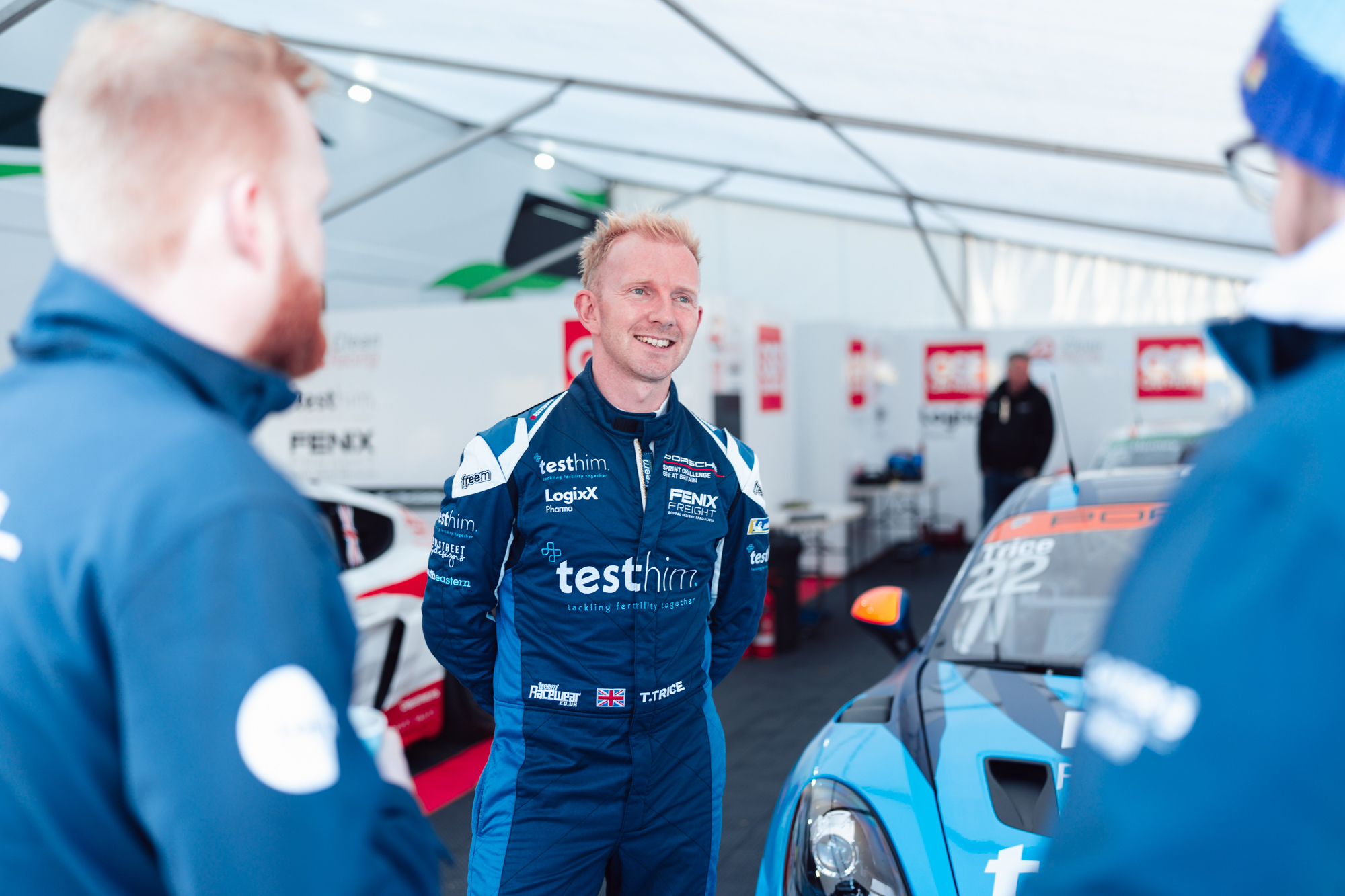International Men’s Day: “Talking about infertility still feels like a taboo subject, especially for men”
In this blog, Toby Trice, professional racing driver and founder of the Racing for Fertility campaign, marks International Men’s Day by sharing his fertility journey.
When I first shared our fertility story, I’ll be honest, it terrified me. Talking about infertility still feels like a taboo subject, especially for men. But opening up turned out to be one of the best decisions I’ve ever made. Not only did it help me, but it’s also helped so many other couples who’ve since reached out to say my story encouraged them to get checked or to ask different questions.
Our journey lasted six years in total. For most of that time, everything was focused on my wife, Katie. Early on, we were told my sperm looked fairly normal on a basic semen analysis. Because of that, our care was led by gynaecologists. Katie went through endless tests, scans, and procedures, all while I sat beside her feeling helpless. She carried the emotional weight of thinking it was “her problem”. Looking back now, that breaks my heart, because I know how much guilt she carried unnecessarily.
Eventually, we were told that in vitro fertilisation (IVF) was our only way to conceive. No one could explain why. We tried to stay positive, but after two failed rounds of IVF, everything fell apart. I sank into a dark place, the kind of depression where you feel completely lost and question your purpose in life.
Motorsport became my escape. I’d always loved racing, and throwing myself into that world gave me something to focus on when everything else felt out of control. But soon, it became more than a distraction. I realised I wanted to use racing for something meaningful. That’s when I started Racing for Fertility, a campaign to raise awareness of fertility struggles and to show people they’re not alone.
Alongside that, I co-founded Testhim with Ian Stones. In those early support group sessions, I remember listening to others talk about their experiences and realising how little we, as men, were included in the fertility conversation. We had male fertility experts join our discussions, and for the first time, I began to understand the complexity of male factor infertility. It wasn’t as simple as a “yes” or “no” result from a semen analysis.
That’s what prompted me to get further tests done. I booked an appointment with a urologist, who arranged an ultrasound and a DNA fragmentation test. The results were eye-opening, my sperm’s DNA was showing high levels of fragmentation, meaning it was being damaged. The likely cause? A large varicocele, a collection of enlarged veins in the scrotum that can affect sperm quality.
Suddenly, everything made sense. It was me all along. I remember feeling both relieved and crushed at the same time. Relieved to finally have answers, but devastated that it had taken six years to get here. Katie had been through invasive treatment, hormone injections, and the heartbreak of two failed IVF rounds that she didn’t need. The guilt of that still sits with me today.
With our finances stretched, we faced a difficult decision. Do we spend what we had left on another round of IVF, or do we try to fix the root cause and see what happens? We decided to go for the latter, and I underwent a varicocele embolisation. Then came the waiting game to see if it made any difference.
Just three months after surgery, before we’d even gone back for a follow-up semen test, Katie fell pregnant naturally. I still get emotional saying that. After everything we’d been through, it felt like a miracle. In 2021, our beautiful boy, Oliver, was born.
When I look back now, I can’t help but think that if I’d been properly investigated at the start, how different things would have been? Could we have avoided the heartbreak, the financial strain, and the mental toll? We’ll never know. But what I do know is that my story isn’t uncommon.
Since sharing our experience, I’ve met so many couples who’ve had similar journeys. It’s made me more determined than ever to change how we approach male fertility. Through my campaign, I’m using motorsport to reach new audiences and start conversations in places you wouldn’t normally hear them. Our fan base is growing across the UK, and I hope to take this message global because the stigma around infertility doesn’t stop at our borders.
If sharing my story helps even one more couple find the right answers sooner, then it’s all worthwhile. But I also know this problem is much bigger than one story. Every time someone feels able to talk about infertility, every man who gets checked, and every couple who feel less alone, that’s how change begins. And I’ll keep doing my bit, both on and off the track, to keep that change moving.

About the author
Toby Trice is a professional racing driver and the founder of Racing for Fertility, a campaign using motorsport to raise awareness of fertility struggles and break the stigma around male infertility. After a six-year journey to fatherhood and the natural conception of his son Oliver, Toby now uses his platform to encourage better education and diagnostics in men’s health. When he’s not behind the wheel, he supports others through his advocacy work and the online fertility support group Testhim, dedicated to male fertility wellbeing.
Disclaimer: The views expressed in this blog are those of the author, they do not necessarily represent the views of the HFEA.
| Publication date: |
|---|

